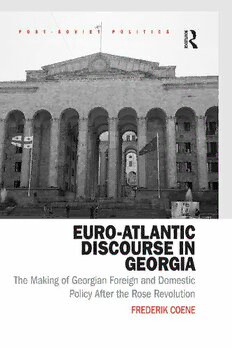Table Of ContentEURO-ATLANTIC DISCOURSE IN GEORGIA
Post-Soviet Politics
Series Editor: Neil Robinson, University of Limerick, Ireland
The last decade has seen rapid and fundamental change in the countries of
the former Soviet Union. Although there has been considerable academic
comment on these changes over the years, detailed empirical and theoretical
research on the transformation of the post-Soviet space is only just beginning
to appear as new paradigms are developed to explain change.
Post-Soviet Politics is a series focusing on the politics of change in the
states of the former USSR. The series publishes original work that blends
theoretical development with empirical research on post-Soviet politics. The
series includes work that progresses comparative analysis of post-Soviet
politics, as well as case study research on political change in individual post-
Soviet states. The series features original research monographs, thematically
strong edited collections, and specialised texts.
Uniquely, this series brings together the complete spectrum of work on
post-Soviet politics, providing a voice for academics world wide.
Also in the series
Systemic and Non-Systemic Opposition in the Russian Federation
Civil Society Awakens?
Edited by Cameron Ross
ISBN 978 1 4724 3504 0
Autocratic and Democratic External Influences in Post-Soviet Eurasia
Edited by Anastassia Obydenkova and Alexander Libman
ISBN 978 1 4724 4124 9
Religion, Politics and Nation-Building in Post-Communist Countries
Edited by Greg Simons and David Westerlund
ISBN 978 1 4724 4969 6
The Politics of Energy and Memory between the Baltic States and Russia
Agnia Grigas
ISBN 978 1 4724 5136 1
Negotiating Armenian-Azerbaijani Peace
Opportunities, Obstacles, Prospects
Ohannes Geukjian
ISBN 978 1 4724 3514 9
Euro-Atlantic
Discourse in Georgia
The Making of Georgian Foreign and Domestic Policy
After the Rose Revolution
FREDERIK COENE
First published 2016 by Ashgate Publishing
Published 2016 by Routledge
2 Park Square, Milton Park, Abingdon, Oxon OX14 4RN
711 Third Avenue, New York, NY 10017, USA
Routledge is an imprint of the Taylor & Francis Group, an informa business
Copyright © 2016 Frederik Coene
The right of Frederik Coene to be identified as author of this work has been asserted by
him in accordance with sections 77 and 78 of the Copyright, Designs and Patents Act 1988.
All rights reserved. No part of this book may be reprinted or reproduced or utilised in any form
or by any electronic, mechanical, or other means, now known or hereafter invented, including
photocopying and recording, or in any information storage or retrieval system, without
permission in writing from the publishers.
Notice:
Product or corporate names may be trademarks or registered trademarks, and are used only
for identification and explanation without intent to infringe.
British Library Cataloguing in Publication Data
A catalogue record for this book is available from the British Library.
The Library of Congress has cataloged the printed edition as follows:
Names: Coene, Frederik.
Title: Euro-Atlantic discourse in Georgia : the making of Georgian foreign
and domestic policy after the Rose Revolution / by Frederik Coene.
Description: Burlington, VT : Ashgate Publishing Company, 2016. | Series:
Post-Soviet politics | Includes bibliographical references and index.
Identifiers: LCCN 2015029847| ISBN 9781472454607 (hardback : alk. paper) |
ISBN 9781472454614 (ebook) | ISBN 9781472454621 (epub)
Subjects: LCSH: Georgia (Republic)–Foreign relations–European Union
countries. | European Union countries–Foreign relations–Georgia
(Republic) | Georgia (Republic)–Foreign relations–1991- | North Atlantic
Treaty Organization–Georgia (Republic) | Georgia (Republic)–Politics and
government–1991-
Classification: LCC JZ1710.A54 C64 2016 | DDC 327.47580182/1–dc23 LC record
ISBN: 978-1-472-45460-7 (hbk)
ISBN: 978-1-315-58078-4 (ebk)
Dedicated to my parents
This page intentionally left blank
Contents
Preface ix
Acknowledgements xi
List of Abbreviations xiii
1 Theoretical and Conceptual Framework 1
2 Georgia and its Euro-Atlantic Orientation 19
3 The Georgian Europeanness 63
4 Euro-Atlantic Discourse as a Legitimacy Management Strategy 97
5 The Euro-Atlantic Community as a New Patron 145
Conclusion and Outlook 161
Bibliography 165
Index 183
This page intentionally left blank
Preface
After gaining independence in 1991, Georgia and its leadership had to find
their place in the international system. Against the background of domestic
constraints and external challenges, the orientation of the country’s foreign
policy was not stable, as the political elite struggled to balance between Russia
and the West. After the 2003 Rose Revolution, especially as relations with
Russia were souring, the Euro-Atlantic orientation, portrayed as a single and
coherent strategy, became the cornerstone of foreign policy as well as a model
for domestic reforms. This promise of a prosperous future offered a new hope
to the Georgian population and seemed unconditionally trusted by politicians in
the West. Scepticism or critical thinking towards President Saakashvili and his
government were equated to pro-Russian treason, creating a precarious situation
where any government action had to be accepted as being in the interest of the
population. This approach has undoubtedly led to an impressive number of
positive changes, but there have also been some doubtful manipulations.
The Euro-Atlantic orientation and impressive reforms emerged simultaneously
with an outspoken rhetoric and active symbolism. References to Europe and the
Euro-Atlantic structures became ubiquitous, as European flags were brandished
throughout the country. And almost all reforms and infrastructure programmes
were promoted as being modelled along ‘European standards’. In addition to the
ruling political elite, opposition and civil society figures constantly referenced
‘Europe’, and to a smaller extent various Euro-Atlantic structures, in their
speeches and publications. This Euro-Atlantic promise, symbolism, and obsession
have galvanised some and aggravated others. The role of the ‘Europeanness’ of the
Georgian nation plays a central role in this process and has puzzled many analysts
and scholars. For example, Pål Kolstø and Aleksander Rusetskii asked: ‘Why is
this European identity so urgent?’1
Having worked in and with Georgia for a decade, I decided to take a closer
look at this phenomenon. This book is the result of the four years of research that
followed.
1 Pål Kolstø and Aleksander Rusetskii, ‘Power differentials and identity formation:
images of self and other on the Russian–Georgian boundary’, National Identities, Vol. 14,
No. 2 (2012): 144.

